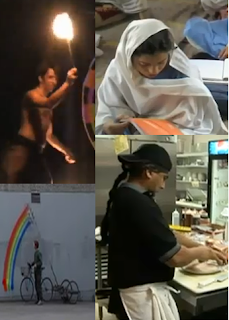My great-grandmother 'Oma' used to tell me a story about when she went to school. Over 100 years ago, in seventh grade her teacher became suspicious that she was cheating in mathematics because she was doing "too well" and she was a girl. He decided to prove that she was a cheat by making her go to the front of the room and try to solve problems like the ones she had already done, and thus embarrass her when she was unable to solve them.
He gave her a series of difficult problems. 'Oma', not only solved all the questions, but she did some of them in her head, without needing to write anything down. The teacher could see that 'Oma' was not cheating, in fact, it was obvious that she was actually much better at math than he was. It was his turn to be embarrassed, but he simply told the girl to sit down and be quiet.
Like many people living in Germany at the time, Oma did not go to school past 8th grade. She wanted to keep learning about math and other subjects, but her family could not afford to not have her work, and they did not really consider sending their daughter to higher levels of school. In terms of inequality, Oma ran into inequality of treatment (from her teacher) and inequality of opportunity in terms of gender and resources. It was also true that general norms and expectations made it very hard for a women to seek higher education at that time, though in principle it was possible.
Two generations later my uncle, who was also good with math and with building things graduated from high school and his parents did not have money to send him to college. He was planning not to go until Oma heard about his plans. She told him to come visit her (in Pennsylvannia, he grew up in Ohio). Anyways, Oma had always wanted to continue in school, and she did not want my uncle to miss his chance, so she told him she would pay for his education if he would promise to work hard for her. He did and now he is now an engineer and very grateful for the opportunity he had because of her.
My own experience has been completely different from that of both my uncle and my great grandmother. Both of my parents hold advanced degrees (law and masters of education) and they emphasized the importance of doing well in school from the very start. It was expected that my sister and I would go to college and my parents were able to support us by paying for our education. At the time, I did not really understand how hard my parents worked to make this possible, nor how lucky I was to be able to just go to college, seemingly, automatically. Behind the scenes, my dad was at work by 7 am, 6 days a week.
Beyond the access to education I had a second very important luxury-- I had the freedom to see my education as an opportunity to learn rather than having to see it as a purely pragmatic effort to get trained for a job. I took courses in art, philosophy, architecture and sciences and did not really worry exactly how it was all going to 'pay off''. I eventually figured out that I wanted to become a researcher and a teacher, and I was able to apply for graduate assistantships to pay for the rest of my education. However, with the current economic situation, I am fairly certain that if I were a student right now, I would be feeling much more pressure to make sure I was preparing for a career. I don't think I would even consider taking the path like the one that I have taken. In terms of inequality, I feel like I had three key advantages-- opportunity (I was sure to be able to attend a decent school), treatment (I was strongly encouraged to excel at school), and finally, (timing or history) the fact that I could consider a career with great potential for creativity and control.
1. Describe two examples of people from your own family (current or earlier generations) who overcame some type of barrier to attend higher education or, due to some issue of inequality did not have access to higher education.
2. Explain how each example illustrates particular types of inequalities [rights, opportunity, treatment, outcome, behavior; norms and expectations can relate to both opportunity and treatement]
3. What will you do with your chance?
Type up your answer in Word or a google Doc.
When you are done, open the following URL.
ps-- a funny yet relevant image from a subway advertisement.















